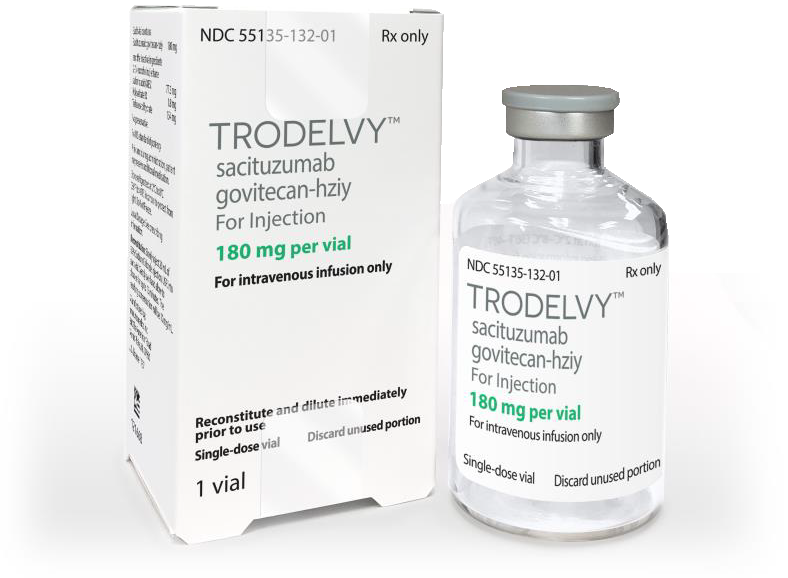2023 Feabhra: The Food and Drug Administration (FDA) has approved sacituzumab govitecan-hziy (Trodelvy, Gilead Sciences, Inc.) for people with hormone receptor (HR)-positive, HER2-negative (IHC 0, IHC 1+, or IHC 2+/ISH-) breast cancer that has spread to other parts of the body and can not be removed. These people have also had at least two other systemic therapies in a metastatic setting.
TROPiCS-02 (NCT03901339) was a multicenter, open label, randomized study that looked at how well a CDK 4/6 inhibitor, endocrine therapy, and a taxane worked in 543 women with HR-positive, HER2-negative breast cancer that had spread or could not be removed. The patients’ disease got worse after receiving any of these treatments. At least two previous chemotherapies were administered to patients with metastatic disease (one of which could be in the neoadjuvant or adjuvant setting if recurrence occurred within 12 months).
Patients were randomly assigned (1:1) to receive either single agent chemotherapy (n = 271) or sacituzumab govitecan-hziy, 10 mg/kg as an intravenous infusion, on Days 1 and 8 in a 21-day cycle. Prior to randomization, the investigator selected a single agent chemotherapy regimen from one of the following options: capecitabine (n=22), vinorelbine (n=63), gemcitabine (n=56), or eribulin (n=130). Prior chemotherapy regimens for metastatic disease (2 vs. 3-4), visceral metastasis (Yes or No), and endocrine therapy in the metastatic setting for at least 6 months were all used to stratify randomization (Yes or No). Patients received treatment up until the onset of unacceptable side effects.
Progression-free survival (PFS), as defined by a blinded independent central review in accordance with RECIST v1.1, served as the primary efficacy outcome measure. Overall survival was a crucial secondary efficacy outcome metric (OS). The median PFS for the sacituzumab govitecan-hziy arm was 5.5 months (95% CI: 4.2, 7.0) and for the single agent chemotherapy arm was 4 months (95% CI: 3.1, 4.4) (hazard ratio [HR] of 0.661 [95% CI: 0.529, 0.826]; p-value=0.0003). For those getting sacituzumab govitecan-hziy, the median OS was 14.4 months (95% CI: 13.0, 15.7), whereas for those receiving single agent chemotherapy, it was 11.2 months (95% CI: 10.1, 12.7) (HR of 0.789 [95% CI: 0.646, 0.964]; p-value=0.0200).
Reduced leukocyte count (88%), reduced neutrophil count (83%), decreased haemoglobin (73%), decreased lymphocyte count (65%), diarrhoea (62%), fatigue (60%), nausea (59%), alopecia (48%), increased glucose (37%), constipation (34%), and decreased albumin (32%) were the most frequent adverse events (25%) in patients treated with sacituzumab govitecan-hziy in TROPiCS-02.
On Days 1 and 8 of a 21-day therapy cycle, 10 mg/kg of sacituzumab govitecan-hziy should be infused intravenously once a week until the disease gets worse or the side effects become too much to handle, whichever comes first.
Project Orbis, an initiative of the FDA Oncology Center of Excellence, was used to carry out this review. Using the infrastructure that Project Orbis provides, international partners can submit and review oncology medications simultaneously. FDA worked together on this review with the Therapeutic Goods Administration (TGA) of Australia, Health Canada, and Swissmedic. At the other regulatory organizations, the application reviews are still proceeding.
View full prescribing information for Trodelvy


